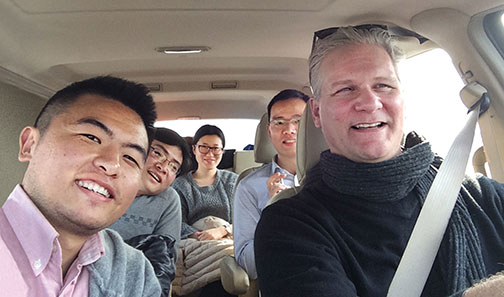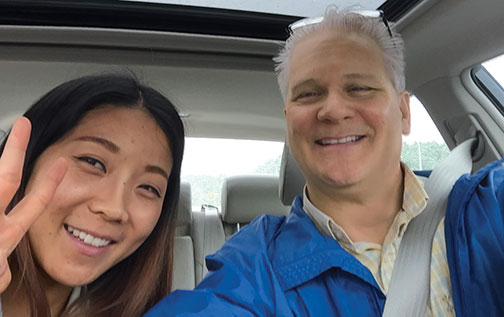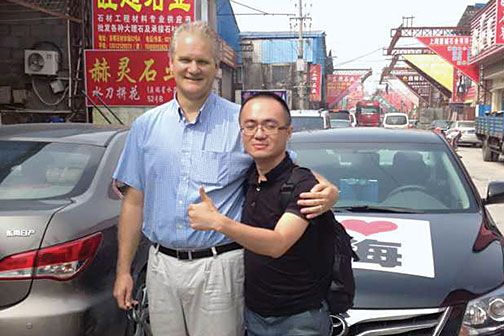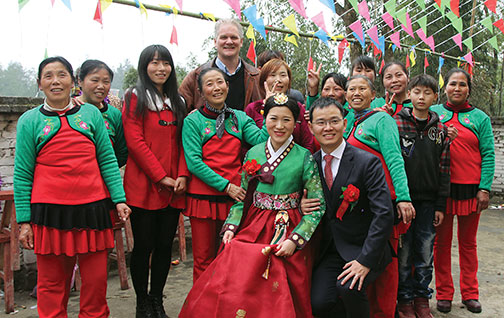Essay: Need a Lift? The Only Cost: A Little Conversation
I first appeared in PAW in the fall of my freshman year, 1982. A column featured students with unusual summer jobs. Mine was driving a taxi in Philadelphia.
More than three decades later, I’m back in these pages for the same reason — taxi driving — but the circumstances are different. These days, I drive a free cab around Shanghai, where I’m a correspondent for NPR. It’s for a series called “Streets of Shanghai,” in which I try to go beyond the narrative of China as a rising superpower and find authentic stories of ordinary people grappling with the country’s staggering change.
The inspiration: that summer job years ago as a Philly hack.
Cab driving was a great education for an aspiring journalist. I learned how to talk to people from all walks of life and got to know Philadelphia, my hometown, in a way I never had. When passengers stepped into my Dodge Dart, they opened up. For a few miles or a long ride to the airport, they shared observations about the city and society as well as their problems and anxieties.
I often saw people at their most vulnerable. There was the elderly woman I drove to the liquor store every few days to buy her bottle of vodka, and the young woman who stood with her luggage one night outside her manicured Main Line home. That passenger wasn’t heading off on a trip. She was leaving her abusive boyfriend, whom she told me all about as I drove her to the safety of a friend’s house.
I continued to drive taxis after graduation and to live in my parents’ basement — not what they had in mind after my four years at Princeton. Eventually, I found work as a reporter and was posted to China in the 1990s and, later, to East Africa. My wife, Julie, a veterinarian, and I returned to China in 2011 because we wanted our kids to see Asia. I also felt I’d never really captured China the first time around and that many Americans still didn’t understand it. Shanghai, a city of soaring skyscrapers with 24 million people, seemed a great place to start. But how to penetrate an authoritarian nation where people are leery of talking with foreign journalists?
Conventional reporting wasn’t going to do it, so I went back to what had worked before and became a cab driver. It wasn’t easy. First, I had to take China’s computerized driving test, which I failed three times. A passing grade was 90 percent, and some of the translated questions were indecipherable.
Consider this one: “When theres [sic] a diversion traffic control on the expressway, a driver can stop by the side to wait instead of leaving out of the expressway, for continually running after the traffic control.”
I don’t know what that means, either, but apparently under Chinese law, you can’t do it.
I finally passed the test and approached Chinese taxi companies, which are all state-owned. The bosses explained that, unlike in the United States, foreigners are not allowed to drive cabs here. Running out of options, I rented a Camry and created my own free taxi service.
My NPR assistant, Yang Zhuo, had magnetic signs made, which we slapped on the car. One set read, “Free, Loving-Heart Taxi,” which sounds better in Mandarin than it does in English. The other signs explained that I was looking to meet people and chat about city life.
It took days to get up the courage to go out driving. I worried no one would get in the car, thinking most people would just laugh when they saw it. I began one Saturday night. Within 15 minutes, I picked up my first passenger on Nanjing Road, the city’s famous shopping street, and promptly got lost. But my passenger, a Chinese fellow visiting from Tokyo, didn’t seem to care. When you offer a service for free, customers don’t expect too much.
Some people were reluctant to step into a stranger’s car. It helped, though, that I’m a gray-haired dad in my early 50s, so I don’t look very threatening. Being a foreigner also was an advantage. When two young textile-factory workers hesitated to get in my cab outside a ferry stop one morning, a man named Du, who works security nearby, stepped in to reassure them.
“It’s OK,” said Du, vouching for me even though we’d just met. “What are you afraid of? Foreign friends are very friendly.” (Fraud and street cons are fairly common in big Chinese cities, so people tend to trust foreigners more than they trust each other.)
In the past year, I’ve driven dozens of passengers. They’ve included migrant workers, farmers, pensioners, bankers, and lawyers. Just as my passengers did in Philadelphia long ago, people in Shanghai have opened up. After our rides, they’ve invited me to lunch, dinner, and into their homes.
I’ve found people I never would have discovered through traditional reporting. Take Chen, a pajama salesman. I met him one day while parked at another ferry stop. My signs drew a crowd of commuters and sparked a conversation about the social fabric of the city. When Chen found out I was from the United States, he explained that he’d moved his family to Los Angeles. China’s rote-learning educational system was crushing his daughter’s spirit and ruining her eyesight, a common concern here. Many Chinese millionaires essentially buy green cards to move their families to America so their kids can enjoy a more open education — as well as clean air. Until I met Chen, though, I had no idea that even a pajama salesman had an exit strategy. The next week, Chen invited me to a service at his home, which doubled as an underground Christian house church.
The taxi has allowed me to roam far beyond Shanghai. Over Chinese New Year, I drove two men back home to the countryside so they could marry their sweethearts. One wedding was held in a remote village where no foreigner had set foot before. I chauffeured guests to the reception and ended up posing for photo after photo with more than 30 curious farmers.
2 Brothers In Rural China Beat The Odds; Practice Law In Shanghai (NPR.org)
Part of what makes driving the free cab interesting is that you never know whom you’re going to meet. One morning last spring, I spotted a woman struggling to hail a cab across from a Tiffany’s on one of the city’s luxury shopping streets. She was dressed in a long gray skirt, white blouse, and oversized sunglasses. I assumed she was a businesswoman.
As I drove her to her hotel near the Bund, Shanghai’s colonial waterfront, she revealed that she was a Vietnamese prostitute who flies into the city on tourist visas and works at a local bar under the name “Cherry.” At night in the bar, she flatters and flirts with clients. In the light of day, though, Cherry seems poignant and vulnerable. She works in Shanghai because she can make 10 to 15 times what she earned before she was laid off from a bartending job in Vietnam’s Halong Bay, where she grew up on a rice farm.
Brushing her finger across the cracked screen of her smartphone, she showed me pictures with her young son back home. Without her heavy mascara and platform shoes, Cherry looked like any other mom. She’s embarrassed by her work, which she’s kept secret from her family in Vietnam and her boyfriend in England. But she’s not so different from many foreigners who come to cash in on China’s boom: She’s here for a short time to make money, improve her circumstances, and move on, leaving little trace.
I’m not the only one exploring the city this way. Hundreds of Chinese, if not more, now work here for Uber. I’ve interviewed more than two dozen drivers, including an airline pilot, a former General Motors engineer, and an accountant named Cici Xu.
Like most, Cici drives less for the money than for the human connection. Her last two years have been tough — she faced illness and infidelity — and sharing her problems and thoughts with passengers has been cathartic. “The vast majority of passengers talk to me very frankly,” says Cici. “I get to know different sides of Shanghai.”
Me, too. With each passenger, a picture of real life in Shanghai comes into sharper focus. The more people I drive, the richer my reporting and understanding of this dynamic, complicated city.
Frank Langfitt ’86, based in Shanghai, covers China for NPR.
















No responses yet